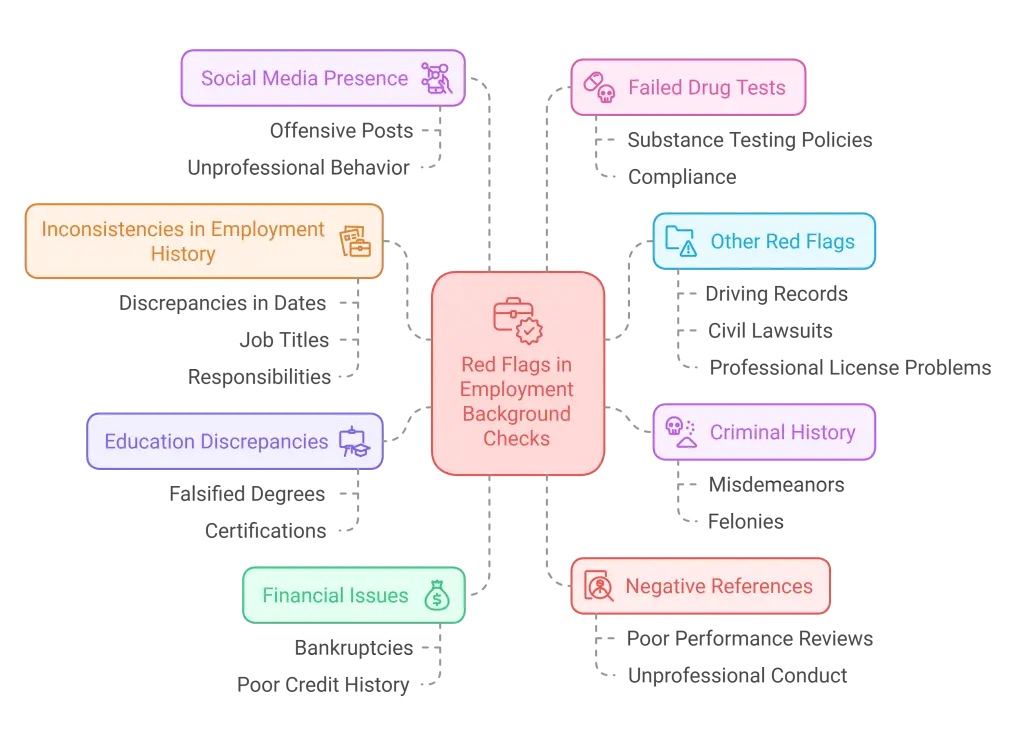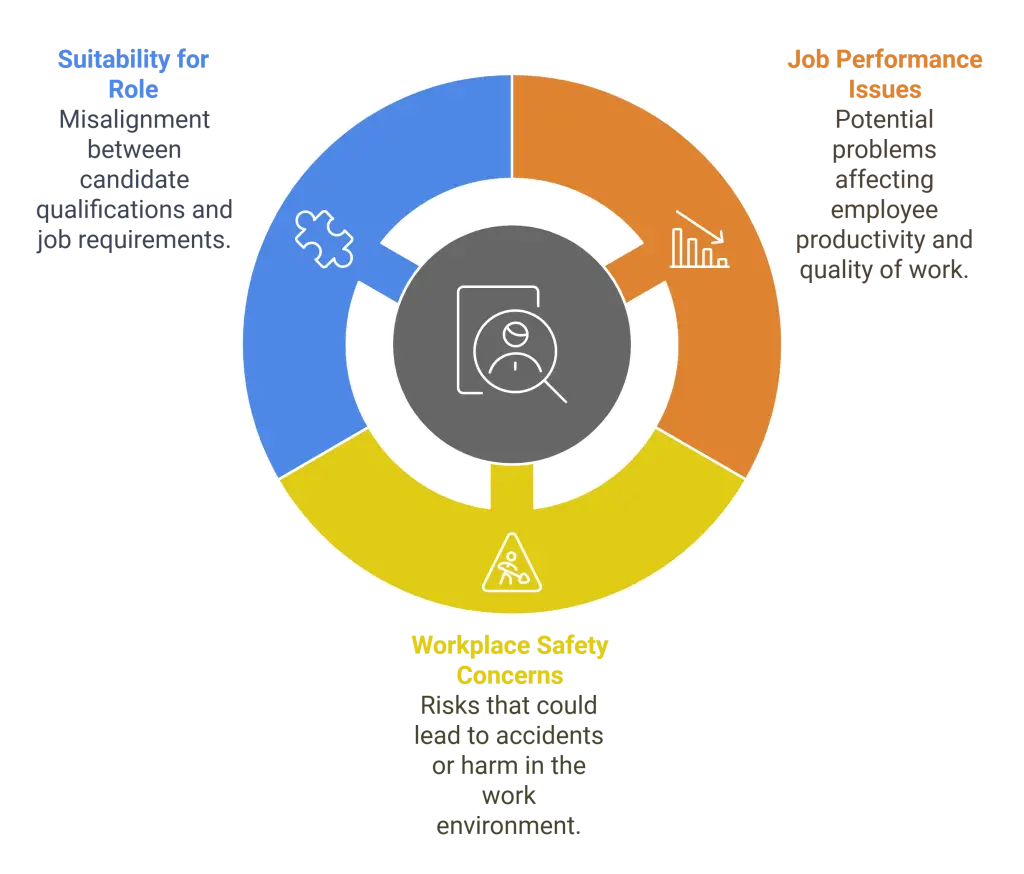Background checks are a standard part of the hiring process for many employers. They provide valuable insights into a candidate's history and help ensure a good fit for the role and the company. Understanding the potential red flags that can arise during a background check is crucial for job seekers and employers. Red flags in background checks don't always spell doom for a candidate, but they often require further investigation and context to understand their impact fully. By being aware of these common issues, job seekers can better prepare to address them, and employers can make more informed hiring decisions.
Key Takeaways
- Employment History Discrepancies: Inconsistencies in job titles, dates, or responsibilities can raise questions about a candidate's honesty and reliability.
- Criminal Records: Past criminal activities, especially those relevant to the job, may influence hiring decisions due to concerns about safety and trustworthiness.
- Educational Misrepresentation: Falsifying degrees or certifications undermines a candidate's integrity and qualifications.
- Financial Irregularities: Poor credit history or bankruptcies can be concerning for positions involving financial responsibilities, indicating potential financial instability.
- Negative References: Unfavorable feedback from previous employers regarding performance or conduct can impact a candidate's prospects.
Common Background Check Red Flags

Inconsistencies in Employment History
One of the most common red flags in background checks is inconsistencies in employment history. These discrepancies can appear in various forms, such as when the information provided by the candidate doesn't match what former employers report. Discrepancies in dates, job titles, or responsibilities can raise concerns about honesty and accuracy. Gaps in employment can be concerning, though there are many legitimate reasons for such gaps, and candidates should be prepared to explain these gaps honestly. Frequent job hopping can suggest instability or a lack of commitment, but in some industries, frequent changes are normal and can be explained positively.
Criminal History
Criminal history is another significant red flag employers look for during background checks. The type of offense and its relevance to the job in question can influence hiring decisions. Different types of offenses, such as misdemeanors and felonies, have different levels of severity and implications for employment. Candidates should be upfront about their criminal history, providing context and showing steps taken towards rehabilitation. Being honest about past mistakes can help build trust with potential employers and demonstrate a commitment to moving forward positively.
EXPERT INSIGHT: Owning your story is essential whenever and wherever you need to represent yourself, whether you're applying for a job or volunteering. Submitting clear and accurate documents, sharing your story candidly and transparently, and ensuring all gaps are well explained are crucial. These elements will be reflected in your background check results, so your goal should be for the results to match your narrative. Most employers are willing to give candidates a second chance as long as they see genuine intent and purpose. This article provides more guidance and insights throughout the process. - Emile Garcia, SHRM-SCP, CHRP, CHRBP
Education Discrepancies
Education discrepancies can also be a red flag for employers. This includes inaccuracies such as falsifying degrees, certifications, or schools attended, which can indicate a lack of integrity. Falsifying educational credentials is a serious issue and can damage a candidate's credibility. Candidates should correct any inaccuracies and be honest about their educational background. Transparency is key, and owning up to any mistakes can help mitigate the impact of these discrepancies.
Financial Issues
Financial issues can be a red flag, especially for roles that involve financial responsibilities. Issues such as bankruptcies, collections, or poor credit history might suggest financial irresponsibility or instability. However, candidates can address these financial red flags by being prepared to explain their financial situation and demonstrate how they have managed or improved it. Proactively addressing financial issues can show employers that the candidate is responsible and capable of handling financial matters. Employers may appreciate the honesty and effort to improve one's financial situation.
Negative References
Negative references can significantly impact a candidate's job prospects. Poor performance reviews or reports of unprofessional conduct from former employers can raise doubts about candidates' suitability for the role. To mitigate this, candidates should choose references carefully, selecting those who will speak positively about their abilities and work ethic. Preparing references for potential calls and discussing possible concerns beforehand can also help ensure a more favorable outcome. Managing one's professional relationships is important to secure strong, supportive references.
Social Media Presence
In today's digital age, a candidate's social media presence can be a red flag during a background check. Employers often review social media profiles to gain insights into a candidate's character and behavior. Offensive posts, unprofessional behavior, or content that contradicts the information on a resume can raise concerns. Candidates should clean up their online profiles, removing potentially damaging content and ensuring their online presence reflects a professional image. Maintaining a consistent and professional online presence can enhance a candidate's appeal to potential employers.
Failed Drug Tests
Drug tests are common in many industries, and failing one can be a significant red flag for employers. Candidates should understand the company’s drug testing policies and be prepared to comply with them. Knowing what substances are tested for and the consequences of failing a drug test can help candidates avoid issues. If a candidate has concerns about passing a drug test, they should address them proactively before applying for positions that require such tests. Transparency and compliance with drug testing policies can build trust with employers.
Other Red Flags
Other red flags might include driving records, civil lawsuits, and professional license problems, depending on the job. A poor driving record can be a significant concern for roles involving driving. Civil lawsuits might indicate a history of legal issues or disputes, raising questions about a candidate's judgment and reliability. Issues with professional licenses can be critical for roles requiring specific certifications, indicating potential problems with meeting industry standards. Candidates should be aware of these potential red flags and address them proactively when applying for jobs.
Why Red Flags Matter to Employers

Employers use background checks to assess potential risks and ensure they are hiring trustworthy and reliable individuals. Red flags can indicate potential issues affecting job performance, workplace safety, or overall suitability for the role. Understanding these concerns helps employers make informed hiring decisions and maintain a safe and productive work environment. Employers can mitigate risks and select the best candidates for their organization by identifying and addressing red flags early in the hiring process. Thorough background checks are a crucial part of due diligence and risk management in hiring.
Addressing Red Flags Proactively
For job seekers, proactively addressing red flags can make a significant difference in the hiring process. Being honest and transparent about issues is crucial, as honesty can build trust with potential employers. Providing context and explanations where appropriate can help mitigate the impact of red flags and show a commitment to personal growth and improvement. Highlighting positive accomplishments and strong references can offset concerns about red flags, demonstrating a well-rounded and capable candidate. Proactive communication and preparation can help candidates navigate potential challenges in their background and present themselves positively to employers.
Conclusion
Understanding background check red flags is essential for both job seekers and employers. By being aware of these issues and addressing them proactively, candidates can improve their chances of securing a job. Employers can make more informed hiring decisions, ensuring they choose the best candidates for their organization. Red flags in background checks don't necessarily disqualify candidates but warrant further investigation and context. With honesty, transparency, and proactive communication, job seekers can navigate potential red flags and demonstrate their suitability for the roles they are applying for.
Call to Action
Understanding and addressing background check red flags can significantly impact your job search. If you need help preparing for background checks or addressing potential red flags, consider using GCheck. Our comprehensive background check services can provide the insights and support you need to succeed in your job search. For more information and to get started, visit GCheck's website.

GCheck Editorial Team
Meet the GCheck Editorial Team, your trusted source for insightful and up-to-date information in the world of employment background checks. Committed to delivering the latest trends, best practices, and industry insights, our team is dedicated to keeping you informed.
With a passion for ensuring accuracy, compliance, and efficiency in background screening, we are your go-to experts in the field. Stay tuned for our comprehensive articles, guides, and analysis, designed to empower businesses and individuals with the knowledge they need to make informed decisions.
At GCheck, we're here to guide you through the complexities of background checks, every step of the way.






